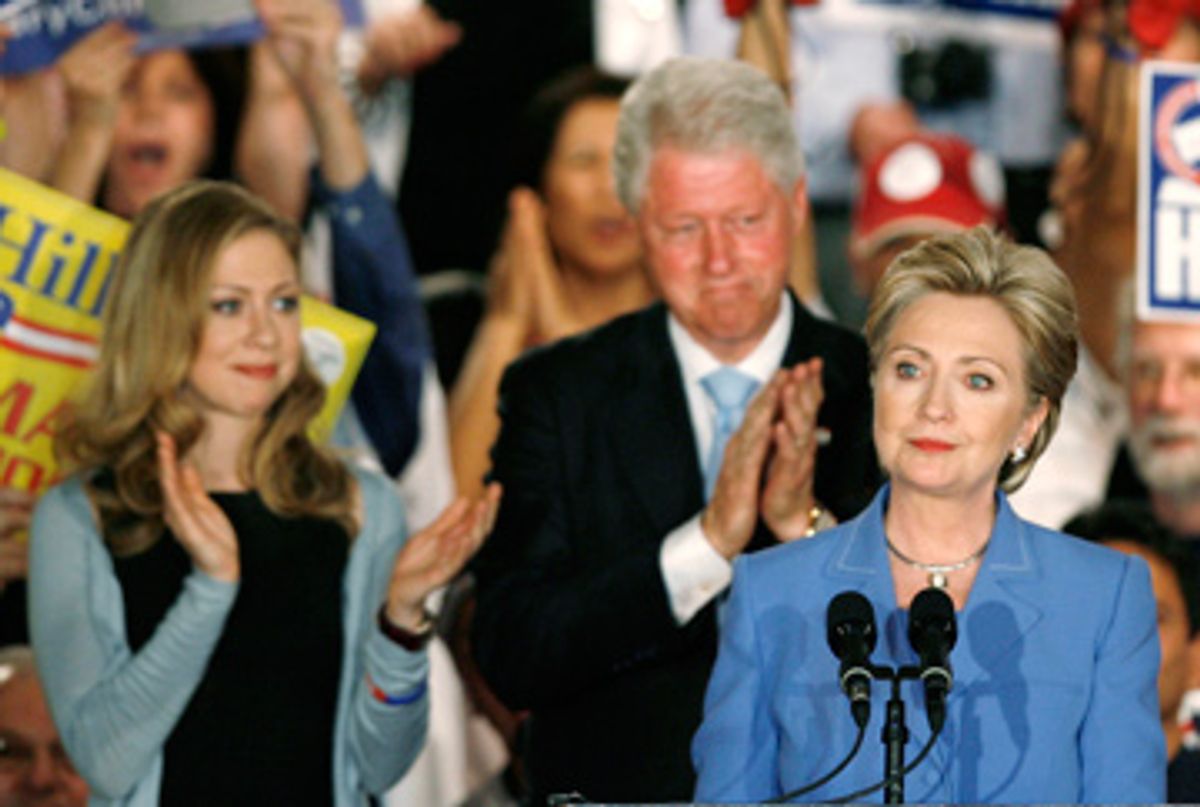Hillary Clinton is one day and two important primaries closer to oblivion. Her hairbreadth victory here in Indiana coupled with her double-digit defeat in North Carolina on the last big night of the 2008 primary season provided a dreams-deferred, delegate-deficit downturn in her already dispiriting fortunes. Not only is Hillary clinging to the hands of a clock in an old-time Harold Lloyd silent movie, but the clock face has begun to wobble.
Barack Obama -- who survived and even prospered after Jeremiah Wright's jeremiads created the worst week of his political career -- felt self-confident enough in his victory speech from Raleigh, N.C., to offer an all-is-forgiven unity message directed at the supporters of his "formidable opponent" who harbor "bruised feelings." But the most important message of the evening was not embedded in Obama's words, but buried in the interstices of the exit polls. It was not that Obama did particularly well among lower-income white voters, but that he did well enough to prevent Clinton from mounting a renewed can't-win-in-November argument.
In North Carolina, Obama swept every economic subgroup, along with 93 percent of the black vote and a healthy 36 percent of the white vote. The verdict from Indiana was more ambiguous, but Obama, often portrayed as an upstairs-downstairs candidate whose coalition seemed based on investment bankers and the inner city, won at least 43 percent support in every income category. (A cautionary note about the invaluable but imperfect exit polls: They are crude instruments that have an addictive power because on Election Night they are essentially the only game in town.)
At the Clinton victory celebration in the Egyptian Room of a Shriner's temple in downtown Indianapolis, a crowd of maybe 400, including many ringers from Washington, collectively averted their eyes when the giant TV screen, tuned to CNN, showed a triumphant Obama in North Carolina. The underdog candidate had obviously hoped for Hoosier clarity when she took her primary-night star turn, but she had to settle for talking vaguely about "coming from behind" as the TV screens showed her with an ever narrowing 52-48 percent lead in the Indiana returns -- numbers that would continue to dwindle.
The essence of Hillary's speech can be reduced to three words -- one that she never uttered (Quit!) and two that she dwelled on (Michigan and Florida). Clinton talked confidently about taking her fight to the upcoming primaries in West Virginia (May 13) and Kentucky (May 20), where the demographics (a largely white, economically hard-pressed Democratic electorate) all tilt in her direction. But her real target (and her only realistic hope for the nomination) pivots around the 366 delegates that were stripped from Michigan and Florida because those two states held queue-jumping January primaries in defiance of Democratic Party rules. As Clinton said pointedly, "I am running for president of all of America ... That's why it is so important to count the votes of Michigan and Florida." Just in case anyone failed to get the message, the crowd chanted on cue, "Count the vote. Count the vote."
Speaking to reporters at the Clinton rally earlier in the evening, former Democratic national chairman Terry McAuliffe argued for justice for these two rogue states, saying, "We need Florida and Michigan to be happy for the general election." Of course, the more immediate political argument is that Clinton desperately needs a delegate boost -- and there are only five small states and Puerto Rico left on the Democratic calendar. Shimmering out there, a bit out of reach, are those phantom delegates from Michigan and Florida, a potentially bigger haul than the roughly 280 superdelegates who have not yet declared their allegiance. That is why the overriding message of the Clinton campaign has become, in Hillary's words Tuesday night, "You know, it seems a little strange to have a nominee chosen by 48 states."
Tuesday night was likely Clinton's last major window of opportunity in this race -- and despite her game face and spirited spin, she undoubtedly knows that it all but slammed on her fingers. Even as she pandered to voters with a difficult-to-intellectually-defend gasoline-tax holiday, the former first lady displayed in recent weeks a populist gusto and a zest for campaigning that undoubtedly represents the triumph of hard-won experience over natural talent. In essence, she finally learned how to run for president (albeit with a slightly cynical bent) just when it was too late in the political season to make a dramatic difference in her prospects.
Nothing, though, should take credit away from Obama for righting his ship after the Rev. Wright wreck. The exit polls in both Indiana and North Carolina asked about Wright, but it is hard to draw firm conclusions from the tantalizing but elusive answers. Without the cross-tabulations, which are not publicly available on primary nights, it is difficult to decipher what the 46 percent of the voters in Indiana meant when they said that Rev. Wright was "important" in making their decision. Even more baffling is why 27 percent of these Wright-sensitive voters still chose Obama as their candidate.
Forty years ago, Bobby Kennedy created an enduring legend by challenging white-backlash voters in conservative Indiana and still winning the primary, his first victory in his tragically foreshortened quest for the 1968 nomination. This month the latest book on the RFK crusade ("The Last Campaign" by Thurston Clarke) will be published. In 2048, it is hard to imagine that readers will thrill to relive the gas-tax debates and electability arguments of the 2008 Indiana primary.
But another kind of history may have been made here Tuesday night as Obama narrowed Clinton's lead to just 22,000 votes with 99 percent of the precincts reporting. When the Democratic race finally sputters to a close with the June 3 primaries (Montana and South Dakota) and the last wavering superdelegates pledge allegiance to somebody, Indiana -- where the Ku Klux Klan once flourished -- may be remembered as the state that vaulted Barack Obama to the nomination.



Shares